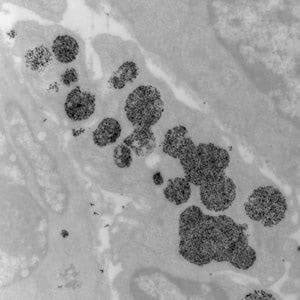- Undergraduate
Bachelor's Degrees
Bachelor of ArtsBachelor of EngineeringDual-Degree ProgramUndergraduate AdmissionsUndergraduate Experience
- Graduate
Graduate Experience
- Research
- Entrepreneurship
- Community
- About
-
Search
All Thayer News

Shown here at 9900x magnification, tumor cells take up magnetic nanoparticles (black dots). When the cells are then exposed to an alternating magnetic field, the nanoparticles heat and kill the tumor cells.
A Dog Has Its Day
May 14, 2013 | Dartmouth Now
In the early fall of 2011, the Orndorff family received some bad news. Eleven-year-old Jenny, a lively, adorable Schnauzer, had cancer.
The outlook was bleak. Jenny’s veterinarian had spotted a large, rapidly growing tumor in Jenny’s mouth. The vet removed as much of the tumor as possible, but he warned Sam and Sandra Orndorff that it was likely that some cancer cells remained.

Shown here at 9900x magnification, tumor cells take up magnetic nanoparticles (black dots). When the cells are then exposed to an alternating magnetic field, the nanoparticles heat and kill the tumor cells.
Unfortunately, he was right. Before long, the tumor had regrown and threatened to spread to Jenny’s nose and surrounding bones. “We were really shocked,” Sandra says.
The Orndorffs traveled to see specialists in upstate New York, but again the news was disheartening. Surgery was one option, but to be sure that all of the tumor was resected, the surgeon would have to remove part of Jenny’s nose, leaving her disfigured. Radiation was another option, but the specialists said that it would take a course of 16 treatments, and even then there was no guarantee that the cancer wouldn’t return.
Then Jenny’s vet told the Orndorffs about another possibility. As part of the Dartmouth Center of Cancer Nanotechnology Excellence directed by faculty at Thayer School of Engineering, P. Jack Hoopes, a Geisel School of Medicine professor of surgery and of medicine, and colleagues at Geisel and Dartmouth-Hitchcock were starting a clinical trial to test the effectiveness of an experimental treatment using magnetic nanoparticles. The trial would enroll dogs who had developed specific kinds of oral tumors, and Jenny’s cancer fit the description the researchers were looking for.
Link to source:
For contacts and other media information visit our Media Resources page.
